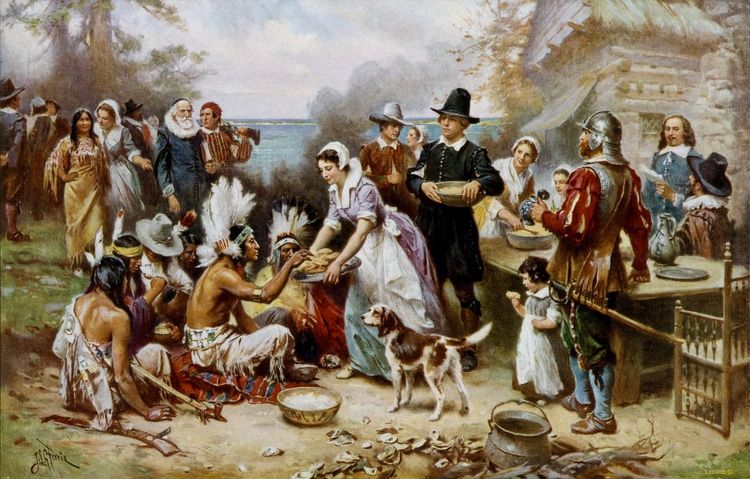


11/24/2004
White people are a little uncertain of how to regard the American Indian. Ever since "The Noble Red Man" (1870), Mark Twain’s caustic deconstruction of James Fenimore Cooper’s romanticized image of the American Indian, white people have vacillated between Indian images: Twain’s disgusting pauper on the fringe of civilization and Cooper’s sublime prince of nature.
American policy has evolved out of both these images, for better or for worse, for both the white man and the Indian.
This Thanksgiving I would like to suggest a new approach altogether.
From the Indian point of view, it requires great moral strength, and in that sense, implies the Cooper image. Certainly, strength is the desired state, in any moment of history, and the idea of strength should never be obfuscated or crippled by any past reference to error or tragedy in its wake. If strength today makes the Indian appear like a "noble savage" again, then so be it.
I propose that Indians forego the chronic disposition of us vs. them in regard to relations between the Indian and the white man. This is an illusory strength, and actually creates weakness. Indians comprise one percent of the American population, and it is not feasible that we can survive any serious political conflict.
I propose that Indians take an attitude of ownership and pride toward America. America developed as the result of our charity and spiritual auspices. Yes, the young, exiled child of Europe soon outgrew our tutelage, but, he can never outgrow the historical truth that we nurtured him, and to us he owes his backbone.
Thousands of years ago, another tribesman once encountered a great monarch of earth. Jacob, an old, wandering shepherd clansman, once came before the Pharaoh of Egypt.
"And Joseph brought in Jacob his father, and set him before Pharaoh: and Jacob blessed Pharaoh." Genesis 47:7.
Jacob was a homeless, migrating herdsman, but he knew what he was as a human being; he knew where he was as a man; and he knew what to do, as a very aged, but wholly self-possessed person. He blessed Pharaoh. The old peasant blessed the king.
This is strength. This is dignity. And this is what Indians should do. We should bless America, our mighty son. He is somewhat wayward, and certainly troubled in his might, but, he clearly wants and needs our acceptance.
After all, we are his adoptive father. No one else in the world is. He has grown greater than us, but nothing will change the original relationship. We are the father, he is the son.
As a strong, self-possessed, independent father, we should of course be honored by our adopted children. We should allow white people to luxuriate in what they are and what they have accomplished. We should graciously receive their laudation for this wonderful land of ours, which we helped make their home.
Among the most soul-stirring words ever written about America were those inspired in the heart of Katherine Lee Bates, in 1898, after viewing the sheer beauty and grandeur of the American physique. From Pike’s Peak, she was overwhelmed by the staggering, stunning, soul-converting beauty of our Mother Earth. This earth. This American earth.
"Oh, beautiful for spacious skies, for amber waves of grain, for purple mountain majesty, across the fruited plain," indeed!
White people have to feel like the land is theirs. They grew up here. They've fought and died here.
"America! America! God shed His grace on thee And crown thy good with brotherhood, From sea to shining sea."
A wondrous prayer, a triumphant vision for all — including the Indian? But the Indian was trampled under foot. How then shall this historical tragedy be healed?
Only Indians can heal the breach. That is the first thing Indians must understand. Secondly, strength demands we heal it. Fatherhood demands we bless our son, who comes to us for acceptance — even forgiveness.
He just got too big, that’s all. This stray child was the seed of giants. We didn’t know. He didn’t know how to tell us, either. He was just a kid, remember?
We can choose to disown him, but is that truly noble and brave? We don’t have to be like him, but we can still bless him. He feels terrible about what happened. Let’s not make it impossible for him to repent.
"When he was yet a great way off, his father saw him, and had compassion, and…blessed him." Luke 15:20.
And why is it hard for the white man to relate to the Indian?
White people are used to being idolized. The fabulous accomplishments of America mesmerize the world. Every race seems ambitious to imitate the cultural ethos of America.
Yet the Indian desires to remain separate in the very midst of the nation.
I believe this troubles the white man deeply. When Indians remain aloof, the white man feels it because the Indian in his heart still condemns the white man. This is unbearably painful.
But the white man need not feel this. He simply needs to understand that the Indian is content with being Indian. The Indian loves being Indian. The white man must simply allow the Indian this freedom.
It is not met as an insult. This is a man to man thing. Let whites be white and Indians be Indian.
The white man would best honor himself in conceding Indianness to the Indian, without protest, or self-condemnation.
The white man hasn’t quite grown up on this point. The Indian must patiently lift him up to full psycho-sociological independence.
Dr. David A. Yeagley is an enrolled member of the Comanche Nation, Elgin, Oklahoma. His articles appear in TheAmericanEnterprise.com, FrontPageMagazine.com, and on his own Web site BadEagle.com, and he is a regular speaker for Young America’s Foundation. David Yeagley’s columns for VDARE.com include An American Indian View of Immigration, and To Deport or not to Deport. David Yeagley is the author of Bad Eagle: The Rantings of a Conservative Comanche.